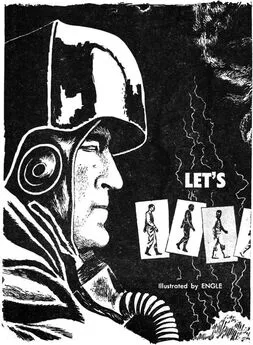Isaac Azimov - Let’s Get Together
- Название:Let’s Get Together
- Автор:
- Жанр:
- Издательство:неизвестно
- Год:неизвестен
- ISBN:нет данных
- Рейтинг:
- Избранное:Добавить в избранное
-
Отзывы:
-
Ваша оценка:
Isaac Azimov - Let’s Get Together краткое содержание
Let’s Get Together - читать онлайн бесплатно полную версию (весь текст целиком)
Интервал:
Закладка:
Let’s Get Together
by Isaac Asimov

A kind of peace had endured for a century and people had forgotten what anything else was like. They would scarcely have known how to react had they discovered that a kind of war had finally come.
Certainly, Elias Lynn, Chief of the Bureau of Robotics, wasn’t sure how he ought to react when he finally found out. The Bureau of Robotics was headquartered in Cheyenne, in line with the century-old trend toward decentralization, and Lynn stared dubiously at the young Security officer from Washington who had brought the news.
Elias Lynn was a large man, almost charmingly homely, with pale blue eyes that bulged a bit. Men weren’t usually comfortable under the stare of those eyes, but the Security officer remained calm.
Lynn decided that his first reaction ought to be incredulity. Hell, it was incredulity! He just didn’t believe it!
He eased himself back in his chair and said ?"How certain is the information?”
The Security officer, who had introduced himself as Ralph G. Breckenridge and had presented credentials to match, had the softness of youth about him; full lips, plump cheeks that flushed easily, and guileless eyes. His clothing was out of line with Cheyenne but it suited a universally air-conditioned Washington, where Security, despite everything, was still centered.
Breckenridge flushed and said, "There’s no doubt about it.”
"You people know all about Them, I suppose,” said Lynn and was unable to keep a trace of sarcasm out of his tone. He was not particularly aware of his use of a slightly-stressed pronoun in his reference to the enemy, the equivalent of capitalization in print. It was a cultural habit of this generation and the one preceding. No one said the "East,” or the "Reds” or the "Soviets” or the "Russians” any more. That would have been too confusing, since some of Them weren’t of the East, weren’t Reds, Soviets, and especially not Russians. It was much simpler to say We and They, and much more precise.
Travelers had frequently reported that They did the same in reverse. Over there, They were "We” (in the appropriate language) and We were "They.”
Scarcely anyone gave thought to such things any more. It was all quite comfortable and casual. There was no hatred, even. At the beginning, it had been called a Cold War. Now it was only a game, almost a good-natured game, with unspoken rules and a kind of decency about it.
Lynn said, abruptly, "Why should They want to disturb the situation?”
He rose and stood staring at a wall-map of the world, split into two regions with faint edgings of color. An irregular portion on the left of the map was edged in a mild green. A smaller, but just as irregular, portion on the right of the map was bordered in a washed-out pink. We and They.
The map hadn’t changed much in a century. The loss of Formosa and the gain of East Germany some eighty years before had been the last territorial switch of importance.
There had been another change, though, that was significant enough and that was in the colors. Two generations before, Their territory had been a brooding, bloody red, Ours a pure and undefiled white. Now there was a neutrality about the colors. Lynn had seen Their maps and it was the same on Their side.
“They wouldn’t do it,” he said.
"They are doing it,” said Breckenridge, "and you had better accustom yourself to the fact. Of course, sir, I realize that it isn’t pleasant to think that they may be that far ahead of us in robotics.”
His eyes remained as guileless as ever, but the hidden knife-edges of the words plunged deep, and Lynn quivered at the impact.
Of course, that would account for why the Chief of Robotics learned of this so late and through a Security officer at that. He had lost caste in the eyes of the Government; if Robotics had really failed in the struggle, Lynn could expect no political mercy.
Lynn said wearily, "Even if what you say is true, they’re not far ahead of us. We could build humanoid robots.”
"Have we, sir?”
"Yes. As a matter of fact, we have built a few models for experimental purposes.”
"They were doing so ten years ago. They’ve made ten years’ progress since.”
Lynn was disturbed. He w'on- dered if his incredulity concerning the whole business were really the result of wounded pride and fear for his job and reputation. He was embarrassed by the possibility that this might be so, and yet he was forced into defense.
He said, "Look, young man, the stalemate between Them and Us was never perfect in every detail, you know. They have always been ahead in one facet or another and We in some other facet or another. If They’re ahead of us right now in robotics, it’s because They’ve placed a greater proportion of Their effort into robotics than We have. And that means that some other branch of endeavor has received a greater share of Our efforts than it has of Theirs. It Would mean We’re ahead in force-field research or in hyperatomics, perhaps.”
Lynn felt distressed at his own statement that the stalemate wasn’t perfect. It was true enough, but that was the one great danger threatening the world. The world depended on the stalemate being as perfect as possible. If the small unevennesses that always existed overbalanced too far in one direction or the other—
Almost at the beginning of what had been the Cold War, both sides had developed thermonuclear weapons, and war became unthinkable. Competition switched from the military to the economic and psychological and had stayed there ever since.
But always there was the driving effort on each side to break the stalemate, to develop a parry for every possible thrust, to develop a thrust that could not be parried in time—something that would make war possible again. And that was not because either side wanted war so desperately, but because both were afraid that the other side would make the crucial discovery first.
For a hundred years each side had kept the struggle even. And in the process, peace had been maintained for a hundred years while, as byproducts of the continuously intensive research, force-fields had been produced and solar energy and insect control and robots. Each side was making a beginning in the understanding of mentalics, which was the name given to the biochemistry and biophysics of thought. Each side had its outposts on the Moon and on Mars. Mankind was advancing in giant strides under forced draft.
It was even necessary for both sides to be as decent and humane as possible among themselves, lest through cruelty and tyranny,friends be made for the other side.
It couldn’t be that the stalemate would now be broken and that there would be war.
Lynn said, "I want to consult one of my men. I want his opinion.”
"Is he trustworthy?”
Lynn looked disgusted. "Good Lord, what man in Robotics has not been investigated and cleared to death by your people? Yes, I vouch for him. If you can’t trust a man like Humphrey Carl Laszlo, then we’re in no position to face the kind of attack you say They are launching, no matter what else we do.”
"I’ve heard of Laszlo,” said Breckenridge.
"Good. Does he pass?”
"Yes.”
"Then, I’ll have him in and we’ll find out what he thinks about the possibility that robots could invade the U. S. A.”
"Not exactly,” said Breckenridge, softly. "You still don’t accept the full truth. Find out what he thinks about the fact that robots have already invaded the U. S. A.”
Laszlowas the grandson of a Hungarian who had broken through what had then been called the Iron Curtain, and he had a comfortable above-suspicion feeling about himself because of it. He was thick-set and balding with a pugnacious look graven forever on his snub face, but his accent was clear Harvard and he was almost excessively soft-spoken.
To Lynn, who was conscious that after years of administration he was no longer expert in the various phases of modern robotics, Laszlo was a comforting receptacle for complete knowledge. Lynn felt better because of the man’s mere presence.
Lynn said, “What do you think?”
A scowl twisted Laszlo’s face ferociously. "That They’re that far ahead of us. Completely incredible. It would mean They’ve produced humanoids that could not be told from humans at close quarters. It would mean a considerable advance in robo-men- talics.”
“You’re personally involved,” said Breckenridge, coldly. "Leaving professional pride out of account, exactly why is it impossible that They be ahead of Us?”
Laszlo shrugged. "I assure you that I’m well acquainted with Their literature on robotics. I know approximately where They are.”
"You know approximately where They want you to think They are, is what you really mean,” corrected Breckenridge. "Have you ever visited the other side?’!
"I' haven’t,” said Laszlo, shortly.
"Nor you, Dr. Lynn?”
Lynn said, “No, I haven’t, either.”
Breckenridge said, "Has any robotics man visited the other side in twenty-five years?” He asked the question with a kind of confidence that indicated he knew the answer. For a matter of seconds, the atmosphere was heavy with thought. Discomfort crossed Laszlo’s broad face. He said, "As a matter of fact, They haven’t held any conferences on robotics in a long time.”
"In twenty-five years,” said Breckenridge. "Isn't that significant?”
"Maybe,” said Laszlo, reluctantly. "Something else bothers me, though. None of Them have ever come to Our conferences on robotics. None that I can remember.”
"Were They invited?” asked Breckenridge.
Lynn, staring and worried, interposed quickly, "Of course.” Breckenridge said, "Do They refuse attendance to any other types of scientific conferences We hold?”
"I don’t know,” said Laszlo. He was pacing the floor now. "I haven’t heard of any cases. Have you, Chief?”
"No,” said Lynn. Breckenridge said, "Wouldn’t you say it was as though They didn’t want to be put in the position of having to return any such invitation? Or as though They were afraid one of Their men might talk too much?”
That was exactly how it seemed, and Lynn felt a helpless conviction that Security’s story was true after all steal over him. Why else had there been no contact between sides on robotics? There had been a cross- fertilizing trickle of researchers moving in both directions on a strictly one-for-one basis for years, dating back to the days of Eisenhower and Khrushchev. There were a great many good motives for that: an honest appreciation of the supra-national character of science; impulses of friendliness that are hard to wipe out completely in the individual human being; the desire to be exposed to a fresh and interesting outlook and to have your own slightly-stale notions greeted by others as fresh and interesting.
The governments themselves were anxious that this continue. There was always the obvious thought that by learning all you could and telling as little as you could, your own side would gain by the exchange.
But not in the case of robotics. Not there.
Such a little thing to carry conviction. And a thing, moreover, they had known all along. Lynn thought, darkly: We’ve taken the complacent way out.
Because the other side had done nothing publicly on robotics, it had been tempting to sit back smugly and be comfortable in the assurance of superiority. Why hadn’t it seemed possible, even likely, that They were hiding superior cards, a trump
Читать дальшеИнтервал:
Закладка:










